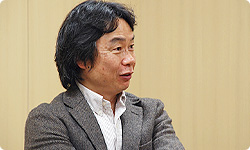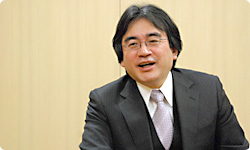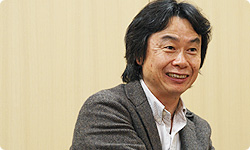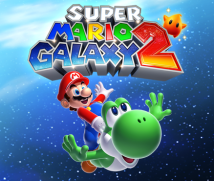3. Resonance is the Key
What exactly do you mean?
Unless you’re careful, there’s a tendency for games like Mario that can be played by children to gradually become childish. Those making the game tend to unconsciously make them that way. Taking how Mario’s line can be scripted as an example, they even propose to write, “Where’d my mommy go?”. When someone in their fifties like me hears their player-character speak childishly like that, it doesn’t quite sit right. After all, Mario wasn’t a game only for children in the first place. As I make a game, I try to keep in mind that guys in their fifties will play it, too. We go back and forth about other issues, as well. “Can we make Mario speak?” “No, Mario is the player, so he shouldn’t talk.” Like that. But he does say things like “mamma mia,” so someone will be like, “Wait wait... He’s talking, isn’t he?!” (laughs)
(laughs)
But that’s not necessarily a bad thing. When it comes to whether a game should be childish or less childish or Mario should talk or he shouldn’t…
Those things aren’t essential.
Exactly. I realised when I talked to Koizumi-san that those things aren’t essential. Whether or not the game world resonates with you as you’re playing the game is what’s most important. For example, when you watch a big-budget movie, you may be amazed by all the pyrotechnics, but at the same time, something isn’t quite hitting home with you.
Because it’s not resonating.
Right. It isn’t resonating, so you can’t get into it. As for Super Mario Galaxy 2, we wanted a suitable amount of story and movies, so we made lots of new enemies, but we wanted this game to be fully elaborated in keeping with the essence of this particular game. If we hadn’t, some players would think things like “Why is this enemy here?” and be jarred out of the experience.
The game wouldn’t resonate with them.
I came to notice that my way of making games may have been to seek for resonance. I didn’t necessarily want to include story or not include story. Rather, I have been making games that I hope will resonate with players, I now think.

I suppose that has a great deal to do with why New Super Mario Bros. Wii 14 found such a large following around the world. 14New Super Mario Bros. Wii: An action game released in Europe in November 2009 for Wii.
I think it’s because we were able to give people something that they felt a connection to.
It resonated.
I think so. When enemies resonate with you, you willingly engage with them. You notice things like how a certain enemy wasn’t scary, but the next time a similar one appears, its colour is a little different and it spits out two rocks instead of one, so you think it must be tougher. You figure things out for yourself and put them to the test. This kind of interaction is interesting. The more of it there is, the more a game will resonate. And I think you can sense a certain inevitability of your being there in that.
Ah, I see. The concept of resonance can explain an awful lot.
You can apply it to figuring out the difference between interesting TV shows and uninteresting ones. Rather than wondering whether the general scenario is interesting or not, what’s important is whether the characters that appear in it are realistic.
What kinds of characters appear in what kinds of situations.
So even though a television drama may feature a general milieu that would usually be of no interest to you, if the characters that appear in it look like real people in your own life, the show will resonate, and you’ll be able to get into it. I think video games are the same way.
Today’s discussion is a little deep. (laughs)
It’s something that has been interesting me greatly these days. (laughs) Along with how games are unique for their interactive nature.
You made Super Mario Galaxy 2 so it would resonate. How has that changed the impression it makes?

I had Tezuka-san play it and tell me what he thought. Right away, he said the tempo had improved.
Is that because the excess elements had been trimmed away?
Simply put, I think it was because he was able to enter into the world of the game naturally.
I see. The world resonated with him. Lastly, are there any other features of the game you would like to point out to players?
Well, we named it Super Mario Galaxy 2, so we aimed at creating a game that would be enjoyable for people who had played its predecessor. And then, one of the challenges of 3D games at the moment is that there are lots of things you have to learn at the start of the game, so there are lots of tutorials at the beginning. Tutorials are nice for helping people to remember the controls for the first time, but they’re a pain for people who already know the controls.
They want to say, “I already know all that, so just let me go on ahead!”
Yeah. But you have to make them.
That’s an ever-present dilemma.
Yes. We run up against that every time we make a Mario game, but we wanted people who had played the previous game to be able to jump right into Mario Galaxy 2, so we confined the tutorials to something called Tip Network that you only have to look at if you want to. That way, if you want, you can put the pedal to the metal right from the start. What’s more, it’s a quite substantial game with, I’d say, about 20% more material compared to its predecessor. When I play it alone late at night, I get worked up and pound the table and shout!

Hmm. I’d like to see that. (laughs)
(laughs) It’s a tough game that makes you always want to give it another shot. So if there’s anyone out there who really wants to master it, it presents a good challenge. And, of course, new players will be able to enjoy that particularly Mario-esque, mysterious world such as they’ve never encountered anywhere else. For example, if Mario takes a big jump off a small sphere, he’ll spin around it forever! (laughs)
That sounds fun!
It’s difficult, though. It isn’t easy. But the pleasure of overcoming those challenges is the real thrill of an action game. There are places that will confuse complete beginners who have never played a 3D action game before. To be honest, we were worried about that right up to the very end.
You looked so worried that I was wondering if there was any help I could give to the team myself.
Yeah. It really helped when you suggested including a DVD called Super Mario Galaxy 2 for Beginners with hints for beginners. At that point, we wouldn’t have been able to put so much in the way of tutorials into the game itself. We had cut down on the tutorials in the game so that players familiar with the previous Mario Galaxy could dig right in, and that DVD allowed us to more than make up for that.
We also included special footage of the development team showing off their skills, so players who are confident in their own skills will also definitely derive some value from watching it.
Using the second Wii Remote to help out is another thing we have made more prominent this time. It’s quite convenient if two players can cooperate, so I hope people will check that out, too.
By the way, you also checked all the text yourself, didn’t you?
Yes, that’s right. It was my first time since Mario 64. At first, when I heard there wouldn’t even be 5,000 instances of text, I got all smug and thought I would revise them all myself, but toward the end of development, I was like, “Aw, I’ll just take care of the really important ones!” (laughs)
(laughs)
I said something like, “The rest is up to you,” but then, for the first time in a long while, got to stand around nitpicking the lines everyone else wrote.
It’s funny to hear about how much you got into it. (laughs)
It was a lot of fun.
Fun?
It was probably a big inconvenience for everyone else, though. They were probably like, “Does it really matter?!” (laughs)
Ah ha ha! (laughs)
I think I was so picky because I really wanted the game to resonate.
Even with guys in their fifties! Just last year, in December, I joined their ranks.
Of course! (laughs)
